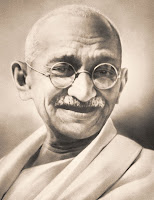
Mohandas Karamchand Gandhi, well know as Mahatma Gandhi was born on 2nd October 1869. in the Porbandar city of Gujarat, to Karamchand Gandhi, the diwan of Porbandar, and his wife, Putlibai. Since his mother was a Hindu of the Pranami Vaishnava order, Gandhi learned the tenets of non-injury to living beings, vegetarianism, fasting, mutual tolerance, etc, at a very tender age. Mohandas was married at the age of 13 to Kasturba Makhanji and had four sons. He passed the matriculation exam at Samaldas College of Bhavanagar. In the year 1888, Gandhi went to University College of London to study as a barrister.
He came back to India after being called to the bar of England and Wales by Inner Temple. In 1893, he accepted a yearlong contract from an Indian firm to a post in Natal, South Africa. There, he faced racial discrimination directed at blacks and Indians. Such incidents provoked him to work towards social activism.
Gopal Krishna Gokhale, a leader of the Congress Party, introduced Mahatma Gandhi to the Indian issues, Indian politics and the Indian people. Gandhi participated in the following movements related to India's freedom struggle:
- Champaran and Kheda Satyagraha,
- Non-cooperation Movement and Swaraj,
- Problems in the Indian National Congress,
- Salt Satyagraha and Dandi March,
- Quit India Movement,
- Freedom and Partition of India,
The inspiring life of Mahatma Gandhi came to an end on 30th January 1948, when he was shot by Nathuram Godse. Nathuram was a Hindu radical, who held Gandhi responsible for weakening India by ensuring the partition payment to Pakistan. Godse and his co-conspirator, Narayan Apte, were later tried and convicted. They were executed on 15th November 1949.
GANDHI'S PRINCIPLES

Mahatma Gandhi followed as well as preached the following principles throughout his life:
- Truth
- Nonviolence
- Vegetarianism
- Brahmacharya (Celibacy)
- Simplicity
- Faith in God
YEARLY LIFE OF GANDHI
1888-1891 : Studied law in London
1893 : Sailed for South Africa
1906 : Began Satyagraha campaign in South Africa to protest the requirement that Indians be fingerprinted and carry identification cards
1915 : Returned to India from South Africa
1917 : Initiated Champaran Satyagraha to alleviate the condition of indigo planters
1919 : Instituted Satyagraha campaign in India to protest the Rowlatt Acts, which deprived all Indians of important civil liberties.
1922 : Ended Non-Cooperation movement against British Raj after his followers were involved in a series of riots and disturbances that violated his policy of nonviolence
1930 : Led Dandi March to collect salt in protest of the British salt tax.
1931 : Signed a pact with Lord Irwin to suspend the Civil Disobedience Movement and went to London to attend Round Table Conference.
1932 : Fasted to protest the treatment of people who belonged to no Hindu caste, the Harijans or Untouchables
1942 : Launched Quit India Movement against British Raj.
1948 : January 30,: Assassinated by Nathuram Godse, a Hindu extremist.
Gandhi Samadhi

MAHATMA GANDHI IS ONE MAN ARMY IN MY PORBANDAR AND INDIA HE IS A TRUE MAN IS THE WORLD.........
ReplyDelete